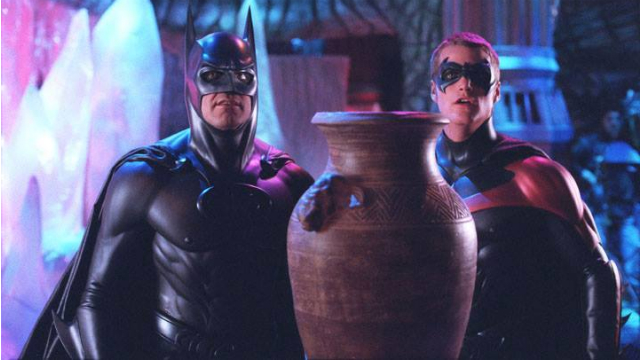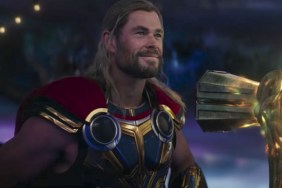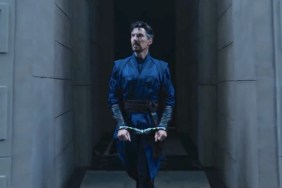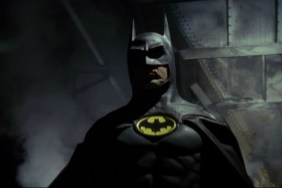If Joel Schumacher‘s Batman and Robin had been intended as a big-budget version of the 1966 Adam West TV series, it might get more credit than it does. Arnold Schwarzenegger‘s Mr. Freeze evokes Otto Preminger’s similarly Austrian-accented version, while his frozen-foods hideout and similarly attired thugs reference classic tropes. Many of the big fight scenes practically scream for “Zap! Pow! Wham!” captions, while Chris O’Donnell’s Robin wisecracks feel like Burt Ward mannerisms. Even the roles that Batman (now played, terribly, by George Clooney) and Robin fit into feel the same. They’ve become local celebrities who make guest appearances at charity balls and have their own credit cards, acknowledged as protectors of the city against any and all threats. Including environmental threats, apparently.
Yet Schumacher denies he ever had the TV series in mind at any point. This only makes him look worse, because at least the TV show was camp on purpose. Batman and Robin‘s new 4K disc keeps all the previous extras from the last Blu-ray set, including an infamous Schumacher commentary track. It is often purported to contain his apology for the movie, but it does not. What he says is that, hypothetically, if you like a movie, you should thank the entire crew. If you don’t like it, blame the director. That’s not really an apology, especially considering the rest of the commentary features him justifying every silly moment in the story with “It’s a comic book!”
RELATED: 4K Review: Batman Forever, The End Is the Beginning Is the End
Schumacher’s idea of a comic book appears formed from half-forgotten memories of what he read as a five year-old. Meanwhile, he chose his villains when he asked his godson which foes on the animated series were cool, at which point his research apparently ended. Yes, the fact that this movie came out while the note-perfect animated series was still a thing made it even more of a letdown at the time.

Batman Forever had more success with toys than any prior Bat-film, for several reasons. For the 1989 film, the toy rights went to brand new company Toy Biz, which couldn’t meet demand. For Batman Returns, Kenner regained the rights, but balked at making Danny DeVito’s grotesque Penguin into a kid’s toy. Instead, Kenner repainted their old Super Powers molds. With Forever, the company went all-out with new sculpts, plenty of heads-up time, and a massive deluxe $90 Batcave that could hold all the vehicles.
Warner Bros. were so happy they insisted Batman and Robin feature lots of new toys. They also saw Jim Carrey exploding as a movie star, and extrapolated from there that fans liked his comedy in the film. Schumacher’s biggest mandates, therefore, were to feature more “toyetic” properties and keep the humor. We should probably point out that up until then, the comedy Schumacher was best known for was D.C. Cab, starring Mr. T.
RELATED: 4K Review: Batman Returns, When Tim Burton Became ‘Tim Burton’
Ironically, the director’s most infamous touch is the most defensible. The nipple-sculpted, Greek statuesque bodyform Batsuits may not be everyone’s choice, but they are a bold choice. They’re also completely in line with Bob Ringwood’s initial concept from 1989 that the outfit should look like a second skin rather than clothing. And sure, the camera fetishizes them. Why not? As Watchmen would later make abundantly obvious, anyone who gets into this kind of suit to beat up bad guys is probably kinky or slightly perverse to begin with. Again, if Schumacher would have fully embraced these implications as a choice, it would be easier to respect him for it.
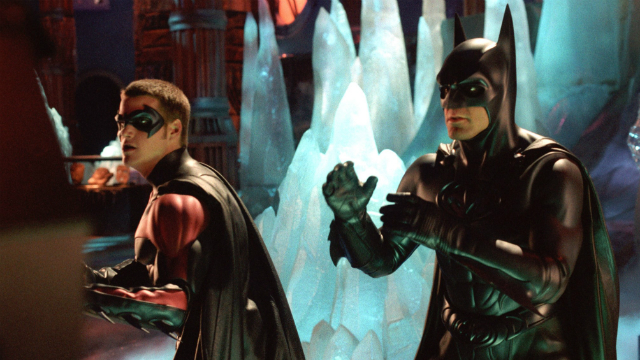
To give the movie credit where it’s further due, it does look like all $125 million of the budget, save Schwarzenegger’s hefty salary at the time, ended up onscreen. This Gotham is garish, but it is elaborate and massive. And 4K clarifies all of it. I used to own the VHS, and it was a nightmare to watch, with all of the reds bleeding into the blues. Undoubtedly inspired by Dick Tracy‘s primary color palette, Schumacher goes for a more limited version of that here, and the newfound clarity keeps every shade within its boundaries, sharply. Even the 1997 digital effects haven’t dated badly, because they were largely used for very basic objects like vines and crystals.
RELATED: 4K Review: Batman vs. Teenage Mutant Ninja Turtles
George Clooney is fine as Bruce Wayne, because in real life he basically is Bruce Wayne. But as Batman, he’s literally just George Clooney forcing more wisecracks. Again, Schumacher shows no understanding of secret identities whatsoever. Here, the super-identities are simply the previous versions, but now with the jokes. And in Uma Thurman’s case as Poison Ivy, an awful Mae West impersonation that makes this her most embarrassing performance of all-time. It doesn’t help that Akiva Goldsman’s script clearly intends her to fall for Mr. Freeze, while Schumacher and Thurman had no interest in playing it that way. As for Jeep Swenson’s Bane, let’s just say the character isn’t meant to be the Hulk.
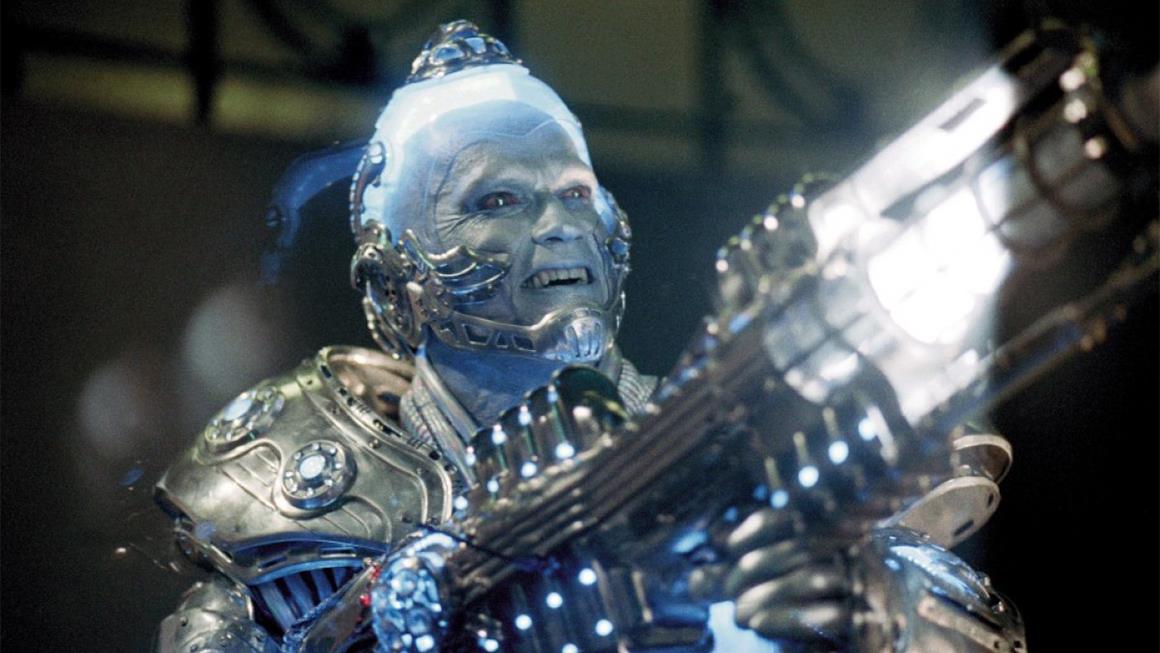
Like Tommy Wiseau in The Room, Schwarzenegger gives 110% energy in creating an oddly accented character who in no way represents how actual human beings behave or speak. In another Room-like moment, Alicia Silverstone as Batgirl saying, “Bruce, it’s me, Barbara!” is reminiscent of Wiseau’s flower shop scene where he removes his sunglasses and hears, “Oh hi, Johnny, I didn’t know it was you.” It would be easy to call this The Room of superhero movies. That’s not entirely inaccurate given the way Schumacher attempts to defend the worst of it. But it’s not consistently as fun, primarily due to its excessive length of two hours and five minutes. It’s a very poorly paced film.
RELATED: 4K Review: Batman 1989, Dawn of the Superhero Movie
Left to his own devices, Schumacher ironically does tend towards darker material, like 8mm or Tigerland. Without excessive guidelines, perhaps his Batman could have looked more like his Phantom of the Opera. We’ll never know. When asked to make a comic book, he made a cartoon, and not the good, Disney kind. It took Warner Bros. eight years to realize they should let the director lead the vision on these movies. For better or worse, that approach got us both Christopher Nolan and Zack Snyder. Then with Justice League, they made a similar mistake by forcing a controversial director’s darker vision to become a more colorful, family friendly movie.
The lesson, as any acting teacher will tell you, is commitment. Audiences can easily a half-hearted take on the material. They may at times dislike a Zack Snyder or Tim Burton movie. But they will ultimately respect it more than a homogenized-to-death film that tries to please everyone.
